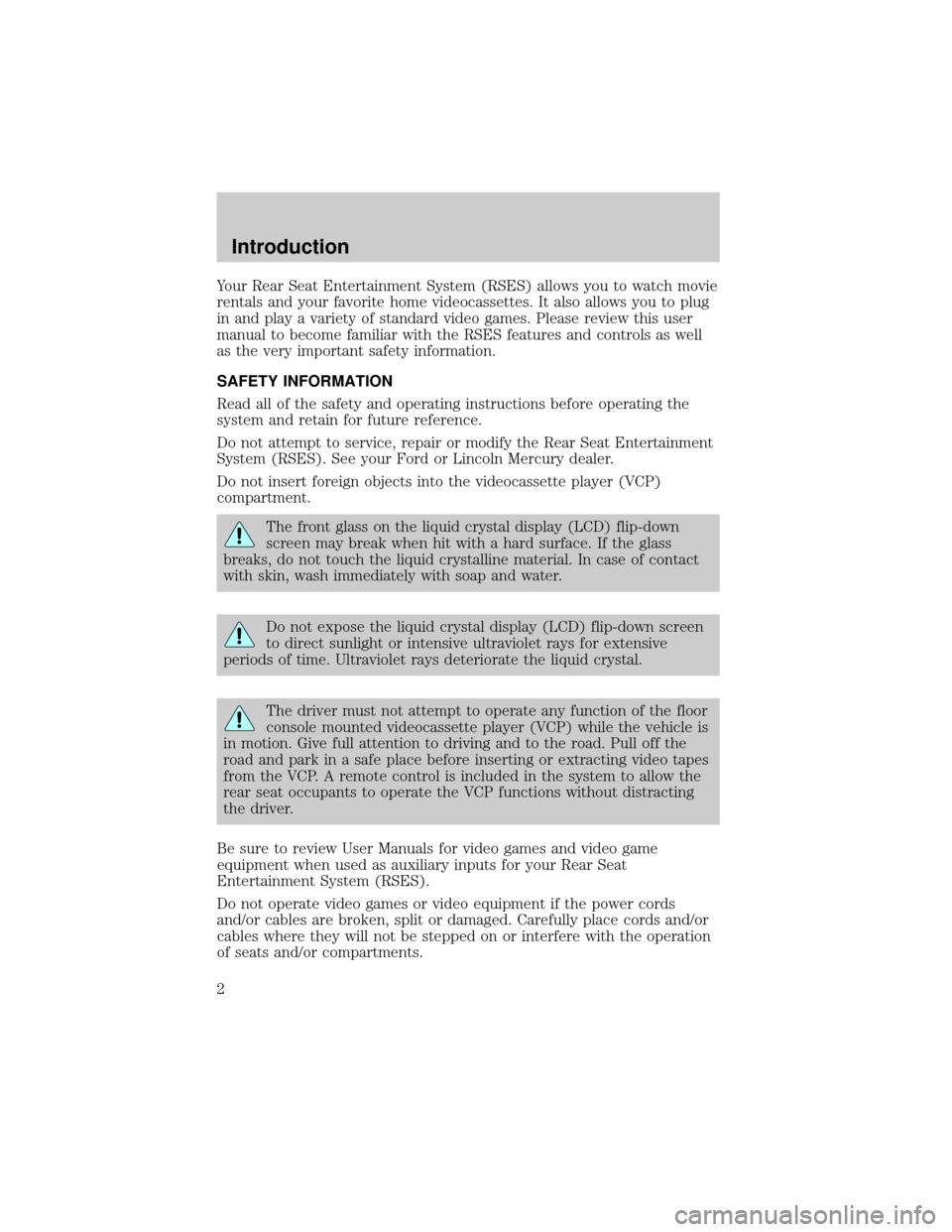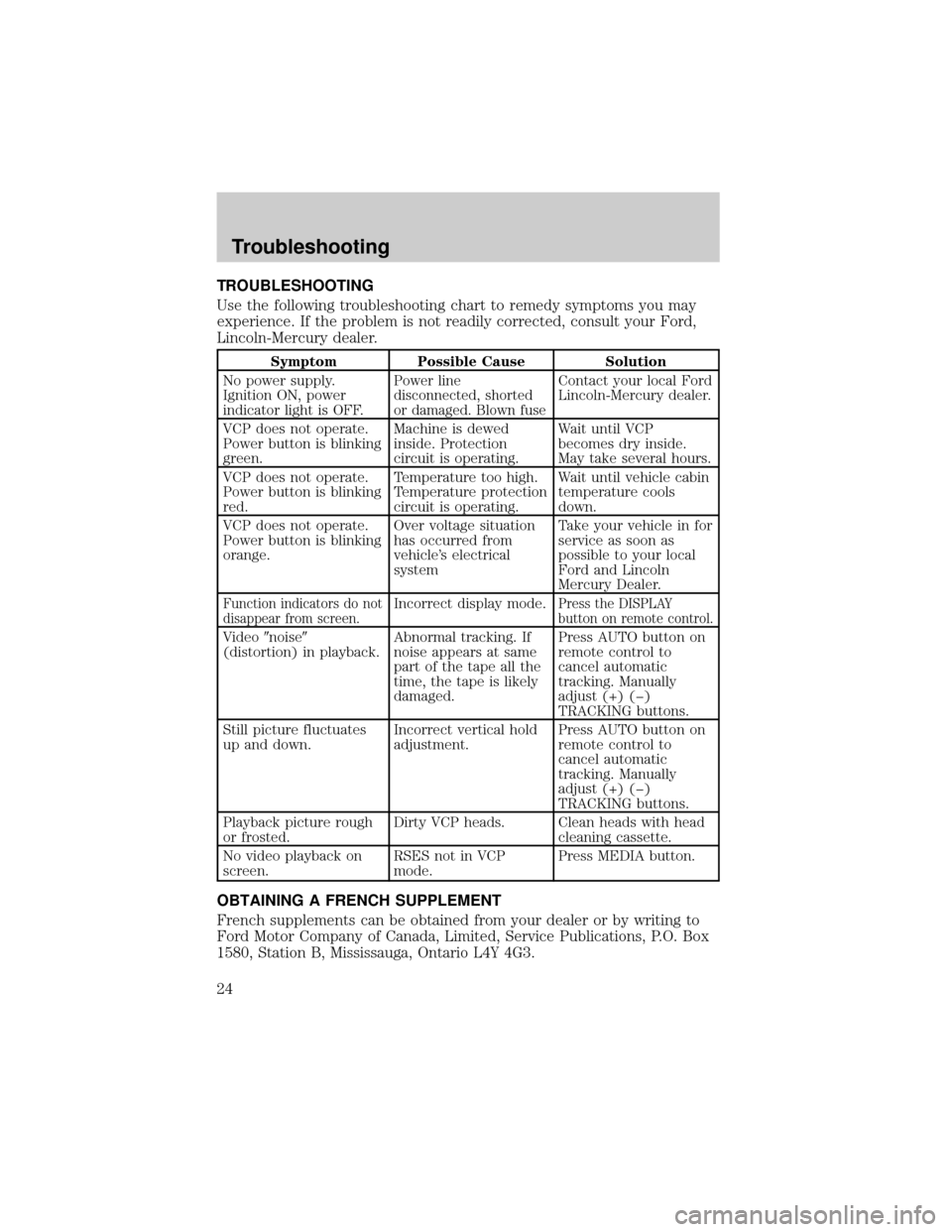service FORD F150 2001 10.G Rear Seat Entertainment System Manual
[x] Cancel search | Manufacturer: FORD, Model Year: 2001, Model line: F150, Model: FORD F150 2001 10.GPages: 24, PDF Size: 0.19 MB
Page 2 of 24

Your Rear Seat Entertainment System (RSES) allows you to watch movie
rentals and your favorite home videocassettes. It also allows you to plug
in and play a variety of standard video games. Please review this user
manual to become familiar with the RSES features and controls as well
as the very important safety information.
SAFETY INFORMATION
Read all of the safety and operating instructions before operating the
system and retain for future reference.
Do not attempt to service, repair or modify the Rear Seat Entertainment
System (RSES). See your Ford or Lincoln Mercury dealer.
Do not insert foreign objects into the videocassette player (VCP)
compartment.
The front glass on the liquid crystal display (LCD) flip-down
screen may break when hit with a hard surface. If the glass
breaks, do not touch the liquid crystalline material. In case of contact
with skin, wash immediately with soap and water.
Do not expose the liquid crystal display (LCD) flip-down screen
to direct sunlight or intensive ultraviolet rays for extensive
periods of time. Ultraviolet rays deteriorate the liquid crystal.
The driver must not attempt to operate any function of the floor
console mounted videocassette player (VCP) while the vehicle is
in motion. Give full attention to driving and to the road. Pull off the
road and park in a safe place before inserting or extracting video tapes
from the VCP. A remote control is included in the system to allow the
rear seat occupants to operate the VCP functions without distracting
the driver.
Be sure to review User Manuals for video games and video game
equipment when used as auxiliary inputs for your Rear Seat
Entertainment System (RSES).
Do not operate video games or video equipment if the power cords
and/or cables are broken, split or damaged. Carefully place cords and/or
cables where they will not be stepped on or interfere with the operation
of seats and/or compartments.
Introduction
2
Page 3 of 24

Disconnect video games and video equipment power cords and/or cables
when not in use.
Avoid touching auxiliary input jacks with your fingers. Do not blow on
them or allow them to get wet or dirty.
Do not clean any part of the RSES with benzene, paint thinner or any
other solvent.
FEDERAL COMMUNICATION COMMISSION (FCC) COMPLIANCE
Changes or modifications not approved by Ford Lincoln-Mercury could
void user's authority to operate the equipment. This equipment has been
tested and found to comply with the limits for a Class B digital device,
pursuant to Part 15 of the FCC Rules. These limits are designed to provide
reasonable protection against harmful interference in a residential
installation. This equipment generates, uses and can radiate radio
frequency energy and, if not installed and used in accordance with the
instructions, may cause harmful interference and radio communications.
However, there is no guarantee that interference will not occur in a
particular installation. If this equipment does cause harmful interference
to radio or television reception, which can be determined by turning the
equipment off and on, the user is encouraged to consult the dealer or an
experienced radio/TV technician for help.
CARE AND SERVICE OF THE VIDEOCASSETTE PLAYER (VCP)
Environmental extremes
Videocassette players (VCP) subjected to harsh environmental conditions
may be damaged or perform at less than maximum capability. To avoid
these outcomes, whenever possible avoid exposing your video cassette
player to:
²extremely hot or cold temperatures.
²direct sunlight.
²high humidity.
²a dusty environment.
²locations where strong magnetic fields are generated.
Temperature extremes
When the vehicle is parked under direct sunlight or in an extremely cold
place for a long period of time, wait until the cabin temperature of the
vehicle is at normal temperature before operating the system.
Introduction
3
Page 4 of 24

Humidity and moisture condensation
Moisture in the air will condense in the videocassette player (VCP)
under extremely humid conditions or when moving from a cold place to
a warm one. Moisture condensation on the tape playback head drum may
damage the videocassette and/or drum. If moisture condensation occurs,
do not insert a videocassette into the player. If a videocassette is already
in the player, remove it. Turn the VCP power ON to dry the moisture
before inserting a videocassette. This could take an hour or more.
Cleaning video heads
Magnetic video heads convert the videocassette into pictures on the
screen during playback. Over a period of time, particles rub off the tape
and are left on the heads. Using an old or poor quality tape together with
dust and air particles, high temperature and humidity cause dirty heads.
Dirty heads generally cause ªsnowyº pictures and, in some severe cases,
blurred or interrupted pictures. A variety of products are available at
video stores to clean tape heads. Use these products sparingly, because
some are abrasive to the video heads. If normal head cleaning
procedures do not resolve the problem, have the system checked by a
service technician.
Cleaning the liquid crystal display (LCD) flip-down screen
Clean the display screen by applying a small amount of water or any
ammonia-based household glass cleaner directly to a soft cloth. Rub the
screen gently until the dust, dirt or fingerprints are removed. Do not
spray the screen directly with water or glass cleaning solvents. Overspray
from these fluids could drip down into the internal electronics of the
screen and cause damage. Do not apply excessive pressure while
cleaning the screen.
Cleaning the exterior of the videocassette player (VCP)
Clean the outside of the VCP with a soft cloth dampened with water.
Avoid getting the VCP controls wet. Do not spray the VCP directly with
water or other fluids as they could drip down into the internal
electronics of the VCP and cause damage.
Foreign substances
Exercise care to prevent dirt and foreign objects from entering the
videocassette player (VCP) compartment. Be especially careful not to
spill liquids of any kind onto the media controls or into the videocassette
player. If liquid is accidentally spilled onto the system, immediately turn
the system OFF and consult a qualified service technician.
Introduction
4
Page 6 of 24

²When a dewed condition exists, the dew sensor circuit stops machine
operation and the POWER button on the VCP will illuminate and
continue to flash on and off. A message on the liquid crystal display
(LCD) flip-down screen will also appear indicating DEW PLEASE
WAIT until the system is dry enough to operate safely.
²If the POWER button on the VCP flashes continuously for longer than
one hour, and the VCP will not return to normal operation after
attempted use on more than one occasion, see your Ford and Lincoln
Mercury dealer.
High temperature sensor circuit
²Excessively high temperatures may cause damage to the videocassette
player (VCP).
²
When the temperature of the VCP becomes too hot, the high
temperature sensor circuit stops machine operation and the POWER
button on the VCP will illuminate red and continue to flash. A message
will also appear on the liquid crystal display (LCD) flip-down screen
indicating HIGH TEMP PLEASE POWER OFF. If this occurs, turn the
power on the VCP off until the system is cool enough to operate safely.
²If the POWER button on the VCP flashes continuously for longer than
one hour, and the VCP will not return to normal operation after
attempted use on more than one occasion, see your Ford and Lincoln
Mercury dealer for service.
Tape protection circuit
²When the system is in PAUSE mode, the tape mechanism will
continue to create tension on the tape.
²When the videocassette player (VCP) is in PAUSE mode for more than
five minutes, the tape protection circuit automatically goes into STOP
mode to avoid damage to the tape.
Over voltage protection circuit
²If the Rear Seat Entertainment System (RSES) experiences excessive
voltage situations from the vehicle's electrical system (approximately
18 volts), damage to the system components can occur.
²When the RSES experiences an over voltage situation, the POWER
button on the VCP will illuminate orange and flash continuously. If this
occurs, see your Ford and Lincoln Mercury dealer for service as soon
as possible.
Description
6
Page 24 of 24

TROUBLESHOOTING
Use the following troubleshooting chart to remedy symptoms you may
experience. If the problem is not readily corrected, consult your Ford,
Lincoln-Mercury dealer.
Symptom Possible Cause Solution
No power supply.
Ignition ON, power
indicator light is OFF.
Power line
disconnected, shorted
or damaged. Blown fuseContact your local Ford
Lincoln-Mercury dealer.
VCP does not operate.
Power button is blinking
green.Machine is dewed
inside. Protection
circuit is operating.Wait until VCP
becomes dry inside.
May take several hours.
VCP does not operate.
Power button is blinking
red.Temperature too high.
Temperature protection
circuit is operating.Wait until vehicle cabin
temperature cools
down.
VCP does not operate.
Power button is blinking
orange.Over voltage situation
has occurred from
vehicle's electrical
systemTake your vehicle in for
service as soon as
possible to your local
Ford and Lincoln
Mercury Dealer.
Function indicators do not
disappear from screen.Incorrect display mode.Press the DISPLAY
button on remote control.
Video9noise9
(distortion) in playback.Abnormal tracking. If
noise appears at same
part of the tape all the
time, the tape is likely
damaged.Press AUTO button on
remote control to
cancel automatic
tracking. Manually
adjust (+) (þ)
TRACKING buttons.
Still picture fluctuates
up and down.Incorrect vertical hold
adjustment.Press AUTO button on
remote control to
cancel automatic
tracking. Manually
adjust (+) (þ)
TRACKING buttons.
Playback picture rough
or frosted.Dirty VCP heads. Clean heads with head
cleaning cassette.
No video playback on
screen.RSES not in VCP
mode.Press MEDIA button.
OBTAINING A FRENCH SUPPLEMENT
French supplements can be obtained from your dealer or by writing to
Ford Motor Company of Canada, Limited, Service Publications, P.O. Box
1580, Station B, Mississauga, Ontario L4Y 4G3.
Troubleshooting
24